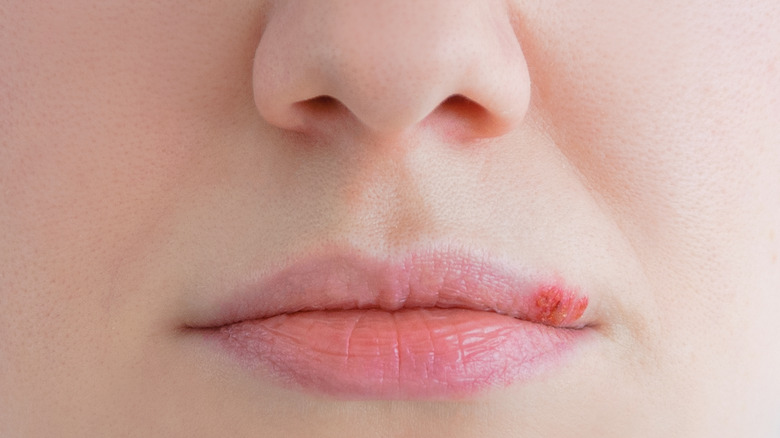How To Tell The Difference Between A Cold Sore And Fever Blister
A viral infection that takes the form of small blisters on your lip or around the mouth is known as a cold sore, which can be itchy, tingly, and painful (via the Mayo Clinic). These sores, caused by the herpes simplex virus, are usually spread by close contact, such as kissing, and are very contagious. For first-timers, these sores can be announced with symptoms like fever, sore throat, pain in the gums, and swollen lymph nodes.
According to Vujevich Dermatology Associates, many of those who have the herpes simplex virus caught it when they were very young, probably as infants. And, once you have the virus, it stays with you for life. The good news is that it tends to remain inactive most of the time, but can be brought on by anything that kicks your immune system into gear, such as an illness, stress, or even exposure to the sun. But, if one flares up, you might ask yourself if what you have is a cold sore or a fever blister. The truth is, they're basically the same thing.
Cold sores and fever blisters are (almost) identical
Although most people will rarely show symptoms, almost 90% of adults in the U.S. carry the herpes simplex virus, reports the National Institute of Dental and Craniofacial Research. There can be a certain stigma associated with the term "herpes," but Intermountain Healthcare notes that there is a difference. Cold sores are caused by type 1 of the herpes simplex virus, while genital herpes is caused by type 2.
There is no real distinction between fever blisters and cold sores, as both are caused by the same virus, according to Vujevich Dermatology Associates. However, the one thing that can separate the two is what actually triggers the immune system response. True to their respective names, cold sores tend to form when someone is suffering from a cold, while fever blisters generally occur as a result of a spike in body temperature. However, no matter what the cause of the blister is, the treatment for both maladies remains the same.
Cold sores can usually be treated with ease
Unfortunately, there is no cure for the virus that causes cold sores, but there are a number of things you can do to help manage the symptoms (via WebMD). You can use home remedies, such as ice, or over-the-counter medications, like Abreva. In more serious cases, you may want to consider a prescription antiviral medication, such as acyclovir or valacyclovir.
Other at-home methods you can try, according to Healthline, include L-lysine, which may suppress the amino acid that causes fever blisters to grow. Zinc may also be helpful, as a 2005 study published in the Journal of Oral Pathology & Medicine showed that participants who took zinc sulfate supplements saw a reduction in the frequency of cold sore outbreaks. In addition to zinc, lemon balm may also be a good home remedy, as demonstrated by a 2012 study. The study, published in Chemotherapy, showed that lemon balm, known as Melissa officinalis, had the ability in some cases to kill the herpes virus and may also affect its ability to attach to cells.
Healthline also notes that you can help to keep cold sore outbreaks at bay by managing your stress, boosting your immunity, and starting treatment at the first sign of an outbreak. You can also try consuming more fresh fruits and vegetables and lessening the intake of salt, red meat, sugar, and sweetened drinks. However, if you're still experiencing cold sore outbreaks, it may be advisable to see your doctor.



